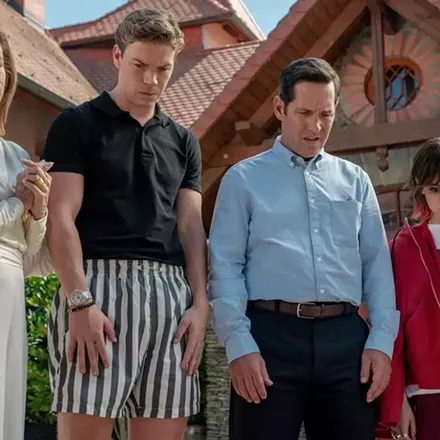The Twilight Saga: Eclipse
Bloodless: Bringing in a horror director still doesn’t make Eclipse anything but teen melodrama.
By Scott Renshaw @scottrenshawThere is, however, a small flaw in that logic: It presumes that the real problem is in the stuff a director can change. To the delight of countless Twi-hards, Twi-moms and their allies—and the befuddlement of those who just don’t get the phenomenon—the movies are stuck with Stephenie Meyer’s books as a foundation. And later directors are stuck with casting decisions that don’t increase the odds for creating great cinema. The Twilight movies keep changing the curtains and painting the walls, while living in a house made of balsa wood.
For the uninitiated, we pick up with Bella Swan (Kristen Stewart) on the verge of graduating from high school and fulfilling her pledge to the vampire-royalty Volturi that she will be “turned” by Edward Cullen (Robert Pattinson) into a vampire herself. But there are a few distractions along the way. News reports from nearby Seattle suggest that an army of powerful vampire “newborns” is being formed, possibly under the guidance of the Cullens’ sworn enemy, Victoria (Bryce Dallas Howard, taking over from Rachelle Lefevre). And there’s the small entanglement of Bella’s werewolf pal Jacob (Taylor Lautner), who’s not prepared to give up on his feelings for Bella despite her professions of eternal connection with Edward.
That romantic triangle is, of course, the cornerstone of the series’ Team Edward-vs.-Team Jacob appeal, and returning screenwriter Melissa Rosenberg gives it plenty of time and attention. The big moments are pitched directly at the core fans, and those scenes—Edward’s proposal to Bella; Bella and Jacob’s first genuinely romantic moment; a tense truce between Edward and Jacob in a mountaintop tent—do exactly what they set out to do. Whatever else one might think about Stephenie Meyer as a writer, she has clearly tapped into something primally heart-fluttering in this story.
Yet, that story is also fundamentally an adolescent melodrama—teen boy troubles writ large—and melodrama is hard for even the best actors to sell under the best of circumstances. Neither is the case with the Twilight films, where key roles are not packed with subtle, refined talent (Billy Burke’s appealing work as Bella’s dad Charlie being a notable exception). Stewart’s breathy readings continue to be annoyingly one-note as Bella repeatedly argues her willingness to give up her humanity, and Pattinson continues to mistake raspy muttering for sultriness. Lautner brought a welcome spark of energy with his performance in New Moon, but he’s still awfully young to be handling the heartfelt speeches he’s asked to deliver here. And they’re actually masters of restraint compared to hilariously over-the-top stuff like Dakota Fanning’s sneering, icy Volturi Jane, or Peter Facinelli’s tight-lipped, eyebrow furrowing as Carlisle Cullen.
But Eclipse truly tips over into unintentional comedy during a trio of flashback sequences. As we watch a colonial-era conflict between vampires and werewolves, and the period-piece “origins” of Cullen clan members Jasper (Jackson Rathbone) and Rosalie (Nikkie Reed), we see the series at its most absurdly florid—and Slade’s selection for this assignment makes the least sense. There may be a few scenes of vampire attacks, and one grand 15-minute battle royale between the Cullen/werewolf team and the newborns, but there’s nothing remotely horror-focused about Twilight’s approach to mythological beasts. You might be able to take away Meyer’s purple-bordering-on-indigo prose, but you can’t take away her vision of a chaste, gothic, bodice-ripper crossed with young-adult angst.
For next year’s adaptation of the series’ final installment, Breaking Dawn, Bill Condon (Dreamgirls) has already been selected to direct. Maybe this time they’ll be looking to inject some energy by turning the Twilight saga into a musical. Heaven knows, at this point anything is worth a try.
THE TWILIGHT SAGA: ECLIPSE
Kristen Stewart, Robert Pattinson, Taylor Lautner
Rated PG-13
|
Scott
Renshaw:
|
Speaking of...
-
Twilight Tuesdays
The first three Tuesdays in November, Summit is bringing 'Twilight Tuesdays' to Cinemark Theaters. Including Century 16 in South Salt Lake and Century Theaters at Union Heights (check theaters for t
- Oct 21, 2011
-
Comic-Con Recap
Thoughts from geek mecca
- Aug 2, 2011
-
Once Upon a Theater
Hollywood mines for fairy-tale gold
- Jul 12, 2011
- More »
More by Scott Renshaw
-
Boulder Weekly Film Critic Talks About Sundance Move to Colorado
Discussing the logistics, finances and politics of the festival's relocation
- Apr 3, 2025
-
Film Reviews: New Releases for April 4
A Minecraft Movie, The Friend, Hell of a Summer, Bob Trevino Likes It, Freaky Tales
- Apr 3, 2025
-
April David Lynch Film Festival at Broadway Centre Cinemas
The Elephant Man, Eraserhead, Mulholland Dr., Blue Velvet and more to celebrate the late director.
- Apr 2, 2025
- More »
Latest in Film Reviews
Readers also liked…
-
Sundance 2025 wrap-up plus February special screenings
Uncertainty about the future location shifts focus away from the movies
- Feb 5, 2025









